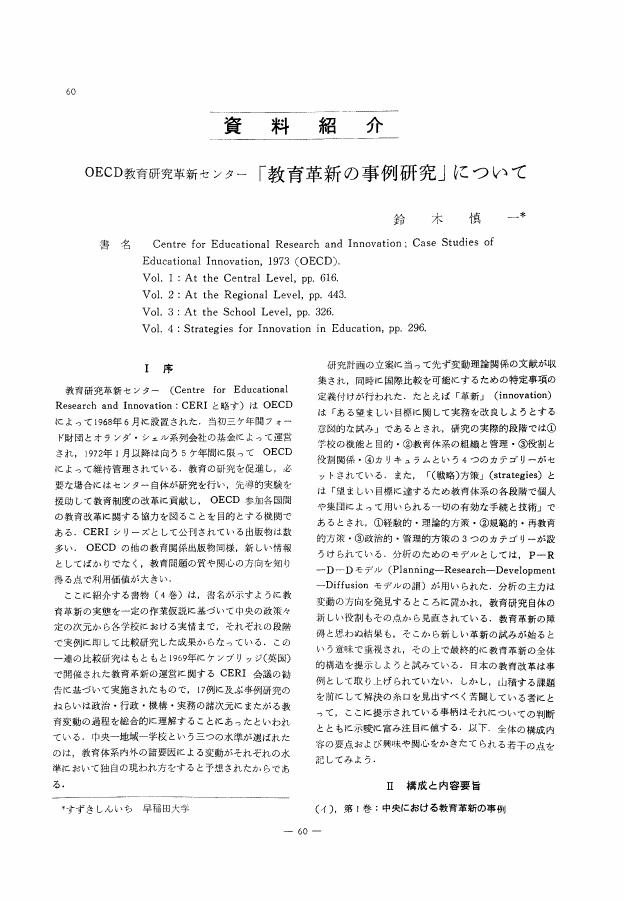1 0 0 0 胡適と国語教育改革 : 中国近代における「国語科」の創成
- 著者
- 山下 大喜
- 出版者
- 日本教育学会
- 雑誌
- 教育学研究 = The Japanese journal of educational research (ISSN:03873161)
- 巻号頁・発行日
- vol.87, no.4, pp.609-620, 2020-12
- 著者
- 中村 高康
- 出版者
- 一般社団法人 日本教育学会
- 雑誌
- 教育学研究 (ISSN:03873161)
- 巻号頁・発行日
- vol.79, no.2, pp.194-204, 2012-06-30 (Released:2018-04-04)
90年代以降の大学入学者選抜制度を取り巻く環境変化の中で最も基本的なことは、大学進学率の上昇に伴う長期的な入学者層の変化である。しかし、こうした入学者層の変化に対応した入試多様化・軽量化現象に対しては、これを批判的に見て学力重視の改革を唱える議論と、これを時代の趨勢と見て社会変動の兆候ととらえる議論とがある。いずれにも共通するのは現代を転機ととらえる思考であるが、その思考自体を相対化する必要がある。
1 0 0 0 石山脩平博士の逝去を悼む
- 著者
- 海後 宗臣
- 出版者
- 一般社団法人 日本教育学会
- 雑誌
- 教育学研究 (ISSN:03873161)
- 巻号頁・発行日
- vol.27, no.3, pp.240-241, 1960
1 0 0 0 OA アメリカの児童研究運動 (Child Study Movement) その思想と性格
- 著者
- 松岡 信義
- 出版者
- 一般社団法人 日本教育学会
- 雑誌
- 教育学研究 (ISSN:03873161)
- 巻号頁・発行日
- vol.49, no.4, pp.353-362, 1982-12-30 (Released:2009-01-13)
- 参考文献数
- 51
1 0 0 0 入試改革の迷走:推進派と研究者それぞれの問題
- 著者
- 濱中 淳子
- 出版者
- 一般社団法人 日本教育学会
- 雑誌
- 教育学研究 (ISSN:03873161)
- 巻号頁・発行日
- vol.87, no.2, pp.190-202, 2020
<p> 今般の大学入試改革は、新体制に切り替わる直前に「英語民間試験導入」と「国語・数学の記述式問題導入」が見送られるなど、迷走状態にある。なぜ、このような状態に陥ったのか。今回の改革の特徴は、教育測定や教育社会学、英文学者や言語学者等の研究者が危うさを訴えているなかで進められた点に求められるが、本稿では、推進派の問題とともに、研究者が何を主張してきたのかについても踏み込みながら、迷走の背景を描写した。</p>
1 0 0 0 政治と教育のあいだ
- 著者
- 上田 薫
- 出版者
- 一般社団法人 日本教育学会
- 雑誌
- 教育学研究 (ISSN:03873161)
- 巻号頁・発行日
- vol.55, no.3, pp.213-219, 1988
1 0 0 0 教育哲学の使命
- 著者
- 上田 薫
- 出版者
- 一般社団法人 日本教育学会
- 雑誌
- 教育学研究 (ISSN:03873161)
- 巻号頁・発行日
- vol.27, no.2, pp.91-99, 1960
1 0 0 0 新しい論理への考察-広岡亮蔵氏の批判にこたえる-
- 著者
- 上田 薫
- 出版者
- 一般社団法人 日本教育学会
- 雑誌
- 教育学研究 (ISSN:03873161)
- 巻号頁・発行日
- vol.26, no.2, pp.149-155, 1959
1 0 0 0 日本の教育改革をどう考えるか
- 著者
- 小林 哲也 寺崎 昌男 大田 堯 稲垣 忠彦 上田 薫 沖原 豊
- 出版者
- 一般社団法人 日本教育学会
- 雑誌
- 教育学研究 (ISSN:03873161)
- 巻号頁・発行日
- vol.52, no.1, pp.1-10, 1985
1 0 0 0 OA OECD教育研究革新センター「教育革新の事例研究」について
- 著者
- 鈴木 慎一
- 出版者
- 一般社団法人 日本教育学会
- 雑誌
- 教育学研究 (ISSN:03873161)
- 巻号頁・発行日
- vol.43, no.1, pp.60-63, 1976-03-30 (Released:2009-01-13)
1 0 0 0 OA 手話とリテラシー : ろう児の指導法をめぐって(<特集>公教育とリテラシー)
- 著者
- 武居 渡
- 出版者
- 日本教育学会
- 雑誌
- 教育學研究 (ISSN:03873161)
- 巻号頁・発行日
- vol.70, no.4, pp.536-546, 2003-12-30
金沢大学教育学部障害児教育
- 著者
- 大竹 美登里
- 出版者
- 一般社団法人 日本教育学会
- 雑誌
- 教育学研究 (ISSN:03873161)
- 巻号頁・発行日
- vol.74, no.3, pp.377-378, 2007
1 0 0 0 OA 児童観についての今日の問題
- 著者
- 森田 乕三郎
- 出版者
- 一般社団法人 日本教育学会
- 雑誌
- 教育学研究 (ISSN:03873161)
- 巻号頁・発行日
- vol.39, no.4, pp.282-288, 1972-12-30 (Released:2009-01-13)
- 参考文献数
- 20
- 著者
- 福島 賢二
- 出版者
- 一般社団法人 日本教育学会
- 雑誌
- 教育学研究 (ISSN:03873161)
- 巻号頁・発行日
- vol.77, no.1, pp.1-14, 2010-03-31 (Released:2017-11-28)
- 被引用文献数
- 3
これまで教育における平等の議論は、「標準」と「異なっている(差異)」という理由で不利な扱いを受けてきた人への補償主義的な資源分配に基づいてなされてきた。しかしながら、こうした分配的正義は、既存の社会・文化と親和的な価値を再生産するというアポリアを抱えている。本稿では、マーサ・ミノウの「関係性」アプローチと竹内章郎の「共同性」論を対象として、分配的正義に内在する支配的価値の再生産構造とそこからの脱却的視座を得ることを目的とする。この検討を通じて、分配的正義が人々の「差異」を本質的・帰属的なものと同定していたことが明らかとなるだろう。これは、「差異」が社会的に構築されたものであるという視角から分配的正義を鍛え直す必要性を示唆するものである。
1 0 0 0 OA 授業研究の現在(<連載>教育の実践研究の現在 第1回)
- 著者
- 村瀬 公胤
- 出版者
- 一般社団法人 日本教育学会
- 雑誌
- 教育学研究 (ISSN:03873161)
- 巻号頁・発行日
- vol.74, no.1, pp.41-48, 2007-03-30 (Released:2018-12-26)
- 著者
- 杉下 奈美
- 出版者
- 一般社団法人 日本教育学会
- 雑誌
- 教育学研究 (ISSN:03873161)
- 巻号頁・発行日
- vol.74, no.4, pp.554-566, 2007
コミュニカティブ・アプローチは1970年代以降、外国語教育における主流の教授法となっている。しかし近年、コミュニケーション能力を過度に重視する姿勢への懸念も高まっており、言語能力の捉え方についての再考が求められる。本稿では、このアプローチの理論的基盤となったデル・ハイムズによる「コミュニカティブ・コンピテンス」の概念を再検討し、外国語教育研究に包摂される思潮を考察した。その結果、従来の研究ではこの概念が学習者の能力としてではなく、学習の結果獲得すべき目標として捉えられてきたことが分かった。一方ハイムズにおいては、他者の発話を咀嚼しながら変容し続ける言語の能力に着目する概念であった。以上の考察を踏まえ外国語教育研究において、学習者がもつ能力に基づいて言語活動および文法教育の捉え方を再考すること、言語能力における文法的知識と社会的言語使用との関係を連続的に捉えることの必要性を提起した。
1 0 0 0 國語教授と國語アクセント
- 著者
- 神保 格
- 出版者
- 一般社団法人 日本教育学会
- 雑誌
- 教育学研究 (ISSN:03873161)
- 巻号頁・発行日
- vol.9, no.11, pp.1107-1121, 1941
1 0 0 0 言語の本質と言語教育
- 著者
- 神保 格
- 出版者
- 一般社団法人 日本教育学会
- 雑誌
- 教育学研究 (ISSN:03873161)
- 巻号頁・発行日
- vol.4, no.6, pp.653-674, 1935
1 0 0 0 OA 精神的に健康な人格の概念 精神的健康性の基準による理想的人間像についての一考察
- 著者
- 上田 吉一
- 出版者
- 一般社団法人 日本教育学会
- 雑誌
- 教育学研究 (ISSN:03873161)
- 巻号頁・発行日
- vol.25, no.2, pp.28-47, 1958-06-10 (Released:2009-01-13)
- 参考文献数
- 43
1 0 0 0 OA 平安貴族社会における女子の教養について
- 著者
- 渋川 久子
- 出版者
- 一般社団法人 日本教育学会
- 雑誌
- 教育学研究 (ISSN:03873161)
- 巻号頁・発行日
- vol.25, no.3, pp.21-32, 1958-07-05 (Released:2009-01-13)
- 参考文献数
- 5





